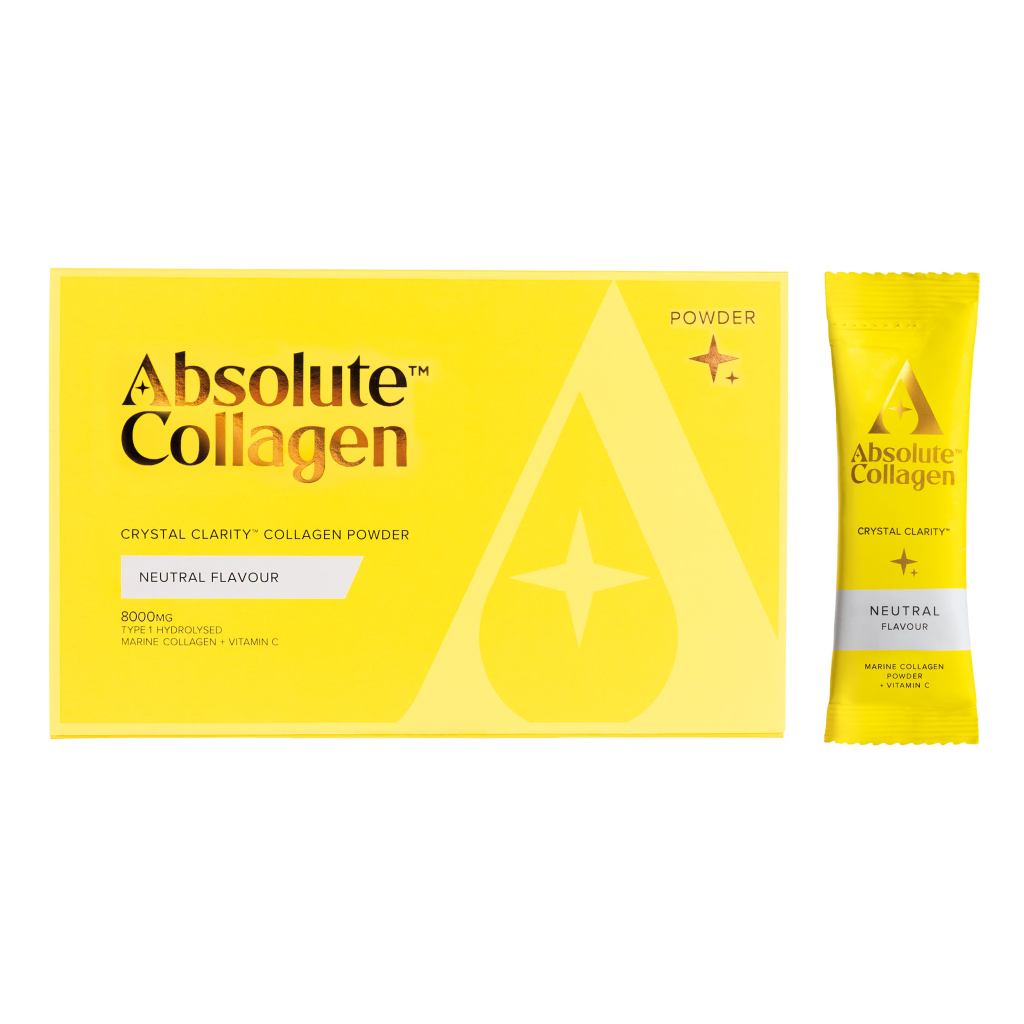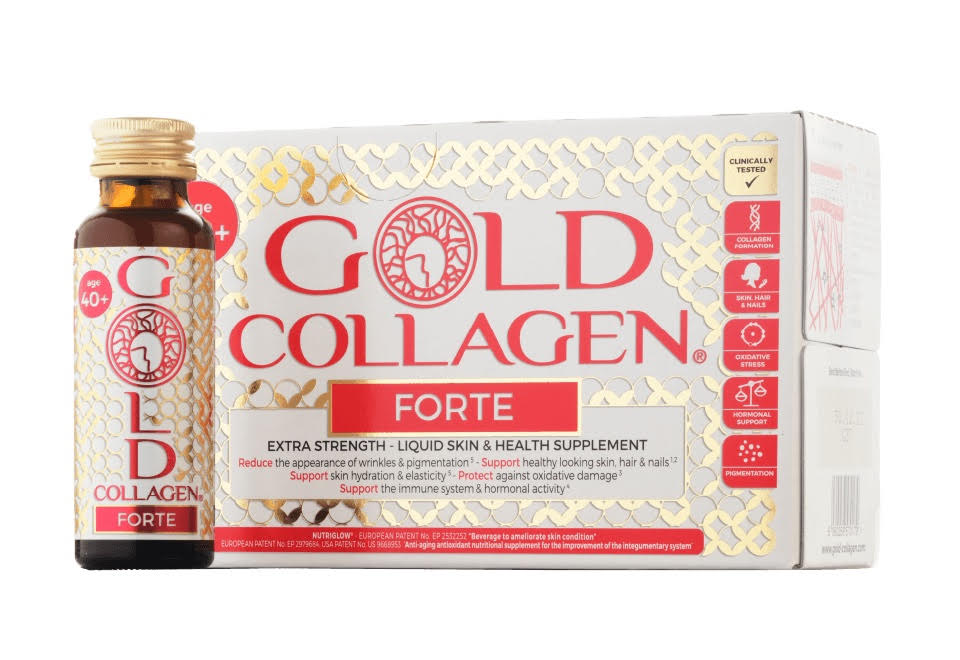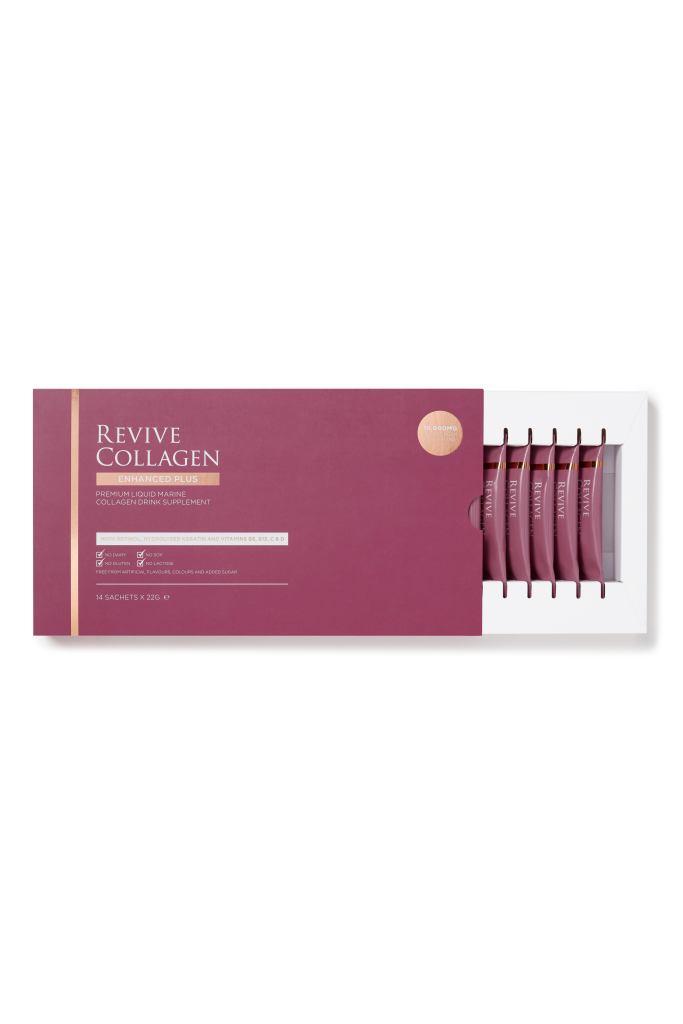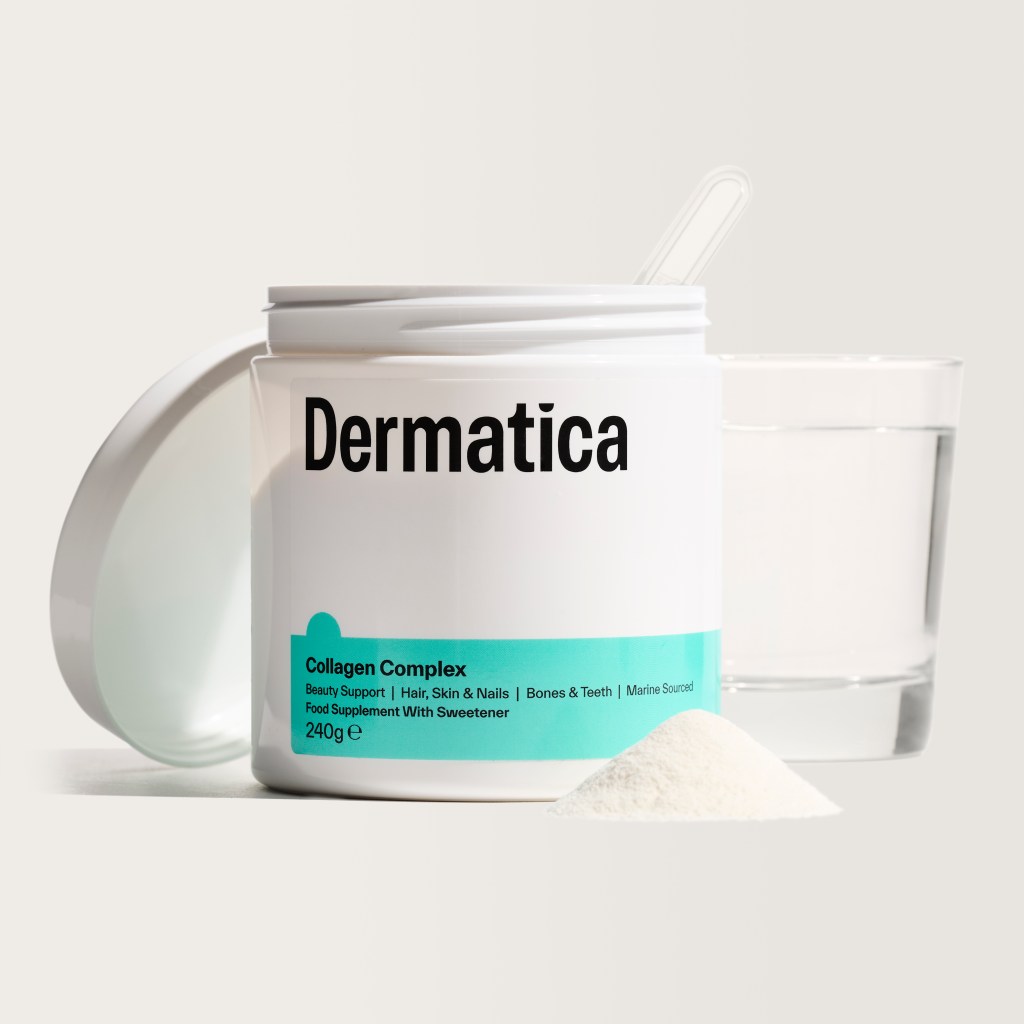
The Time Has Come to Ask . . . Do I Need Collagen Supplements?

Are you taking collagen supplements? Whether you’ve hit your 30s and started downing a sachet every morning or are still on the fence, there’s no denying that these are the supplements on everyone’s (physical or metaphorical) lips right now.
The converted are converted, raving about benefits for not just your skin, but the potential to improve your joints and hair. Plenty of celebrities are in this camp, with Amanda Holden as brand ambassador of former TOWIE star Sam Faiers’ brand, Revive Collagen, and Denise Lewis as the face of Gold Collagen’s Artron Extreme range. But the sceptics are still sceptical. Dermatologists, in particular, tend to be cautious about whether to recommend collagen supplements. This is partly because the efficacy of these supplements can vary wildly, depending on the type of collagen used and its delivery system, which determines if, how and where it is absorbed into the body.
So, to help you decide whether collagen supplements are a must-have in your routine or a fad that’s not worth wasting your money on, allow PS to dive into the details.
Experts Featured in This Article
Dr Shendy Engelina, is Consultant Dermatologist and Clinical Service Lead at Dermatica with an interest in both medical and cosmetic dermatology, as well as working in the NHS.
Dr Dave Reilly is the Senior Scientist at Absolute Collagen.
Dr Nina Bal is an Aesthetic Doctor and qualified dental surgeon, as well as a leading name in injectables.
What Is Collagen?
Before we even begin, it’s worth pausing for a second for a mini biology lesson. So often, we jump on trends or products getting hyped up without really understanding the background. “Collagen is the main protein that gives structure to our skin, nails, bones and ligaments, and is what keeps our skin firm, smooth and elastic,” explains Dr Shendy Engelina, Consultant Dermatologist and Clinical Service Lead at skincare brand Dermatica.
When we’re born, we have collagen by the bucket load, and that’s why babies’ skin is so deliciously doughy and plump. We hold onto these collagen stocks throughout our childhood, teens and early twenties, but from around 25, their levels naturally deplete. Our body doesn’t hold onto as much collagen, and makes it at a slower rate. As the amount of collagen our body produces starts to go south, so does our skin. Without this natural scaffolding to keep it in place, loose skin and lines appear on our complexions. Picture it like taking the stuffing out of a cushion – the cover won’t hold its shape as well without it. It’s not the most flattering image to demonstrate, but you get the gist.
How Should Collagen Supplements Work?
The logic is that collagen supplements work by topping up the lost stocks of this important protein, turning back the clock to make our skin look younger. According to Dr Engelina, “research shows that collagen supplementation can significantly improve skin hydration and elasticity while also reducing the appearance of wrinkles.”
Although you can get collagen from your diet, our skin is always at the back of the queue for the good stuff. When dishing out vitamins and minerals, our body (rightly) prioritises our essential organs, so for there to be anything left over for the skin, there needs to be plenty to go around. It’s a bit like trying to split one small bag of crisps between five versus a sharing bag. By adding more collagen into the mix with supplements, there should, in theory, be enough for your skin to reap the benefits.
Do Collagen Supplements Actually Work?
Sounds simple, right? More collagen equals younger skin? The problem is that it is very difficult to actually get extra collagen into the body. Collagen molecules are big, which is why collagen skincare is often dismissed. There is far stronger evidence for ingredients like peptides and retinoids that encourage collagen production than there is for applying collagen directly to the skin.
It’s the same issue with ingesting collagen. Swallowing a molecule of collagen doesn’t mean that it’s going to do anything. “Collagen as a protein in our diet is extremely large and viscous (gloopy) and needs to be broken down in the stomach before it passes into the small intestine,” explains Dr Dave Reilly, Senior Scientist at Absolute Collagen. “The only way that collagen can be fully absorbed is when it is fragmented into smaller molecules,” confirms Dr Nina Bal, aesthetic doctor at GetHarley. “The majority of collagen supplements on the market are therefore not absorbed, they just get flushed out of the body.” In short, not all are created equal and many end up being a waste of money.
How Can You Tell A Good Collagen Supplement From A Bad One?
To sort the good from the bad, these four things are important to keep in mind when shopping for collagen supplements. Quality collagen brands will want to shout about all these things, so they shouldn’t be too hard to spot.
Type of collagen
There are three types of collagen: bovine, marine and vegan. Marine has a smaller molecular size than bovine and is considered the most effective. Not everyone is comfortable consuming animal products, which is why vegan collagen exists, but the evidence for how effective these alternatives are isn’t as strong.
Delivery system
For collagen to get into our bloodstream, it needs to make it as far as the gut and then be absorbed. There are different ways for this to happen. The gold standard delivery system is considered to be hydrolysed collagen and collagen peptides, which is “where the collagen molecules are broken down into smaller peptides that your body can actually absorb,” explains Dr Engelina.
“What people often do not realise is that manufacturers of hydrolysed collagen effectively mimic the action of the stomach in making the collagen more soluble and easier to digest, and therefore hydrolysed collagen is not affected by the acidity of the stomach, as it has already been processed,” adds Dr Reilly. It’s a bit like chopping up an apple into bite-sized pieces.
The other common delivery system is liposomal, where the collagen is wrapped in a tiny oil-based bubble that allows it to travel through the body. The potential issue with liposomal collagen is that this bubble can break down before the collagen has made it to our gut.
Amount of collagen
The sweet spot of how much collagen a supplement should have is “ideally at least 2.5 grams per day,” says Dr Engelina.
What else is in the formula
“A good collagen should also be enriched with evidence-based vitamins and minerals, like vitamin C, that are proven to support collagen production and overall skin health,” Dr Engelina explains. Look out for anything unnecessary, too. If the ingredients list starts with ‘bulking agent’, it’s probably not good quality. We would also steer clear of anything with artificial colouring or that has additives too high up the list.
Are Collagen Supplements Safe To Use?
Collagen supplements are generally considered safe to use, but as you are ingesting them, it is always best to be cautious. “Those made from marine sources may contain fish, making them unsuitable for vegetarians, vegans or individuals with related allergies,” cautions Dr Engelina. “Pregnant or breastfeeding women, anyone with existing kidney or liver disease and those on blood-thinning medications should consult a healthcare provider before using collagen supplements.” If you’re unsure, check with your GP first.
Are There Other Ways To Improve Your Collagen Production?
Still not sure about collagen supplements? Or just really want to max out on skin-plumping goodness? “There are several lifestyle and dietary changes you can make to naturally increase collagen production,” advises Dr Engelina. “In terms of your diet, foods rich in vitamin C, like citrus fruits and strawberries, protein, such as chicken and fish, and bone broth, all support collagen production. As for lifestyle, always protect your skin from harmful UV rays, which break down collagen. Quitting smoking, staying hydrated and exercising regularly also help to maintain healthy collagen levels in the skin. Last but not least, getting enough sleep is crucial as this is when your skin (and body) repairs, regenerates and produces collagen.” Unless you’re doing all of these things alongside, you’re unlikely to see results from your collagen supplement.
Collagen Supplements to Try
If you want to give it a whirl, these are considered the best collagen supplements on the market right now. Remember that you won’t see results overnight. Be patient and consistent, and you should start to notice the difference after around 12 weeks.
Absolute Collagen Crystal Clarity Marine Collagen Powder Supplement
Absolute Collagen has worked hard on clinical trials to back up its claims, and this supplement is proven to replenish, restore, firm, smooth wrinkles, improve evenness and boost elasticity in just 6 weeks. The taste is nice and neutral, which means you can add it to any drink without making your morning coffee taste strange.
Gold Collagen Forte Extra Strength Liquid Skin & Health Supplement
This is the best collagen supplement for anyone who is also prone to hyperpigmentation. It contains a generous helping of vitamin C to not only support the production of more collagen in the skin but also to shield it from damage and reduce the appearance of dark marks.
Revive Collagen Enhanced Plus Hydrolysed Marine Collagen Drink
Going the extra mile, this marine collagen supplement has been enhanced with retinol to support collagen production and keratin to support healthier hair. A good option for anyone looking for an all-round refresh.
Dermatica Collagen Complex
The pros at Dermatica have added 5000mg of marine collagen per serving to this supplement, which is double the minimum dose needed to firm your skin. The powder is easy to incorporate into your routine – just add a couple of scoops to a cold drink.
Jess Beech is a freelance beauty journalist with over a decade of experience in the industry, writing for publications like Woman & Home and working with prestigious brands including Trinny London and Beauty Pie.






